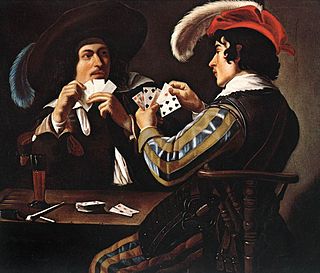
A card game is any game using playing cards as the primary device with which the game is played, be they traditional or game-specific. Countless card games exist, including families of related games. A small number of card games played with traditional decks have formally standardized rules with international tournaments being held, but most are folk games whose rules may vary by region, culture, location or from circle to circle.
Five-card draw is a poker variant that is considered the simplest variant of poker, and is the basis for video poker. As a result, it is often the first variant learned by new players. It is commonly played in home games but rarely played in casino and tournament play. The variant is also offered by some online venues, although it is not as popular as other variants such as seven-card stud and Texas hold 'em.

Poker is a family of comparing card games in which players wager over which hand is best according to that specific game's rules. It is played worldwide, but in some places the rules may vary. While the earliest known form of the game was played with just 20 cards, today it is usually played with a standard deck, although in countries where short packs are common, it may be played with 32, 40 or 48 cards. Thus poker games vary in deck configuration, the number of cards in play, the number dealt face up or face down, and the number shared by all players, but all have rules that involve one or more rounds of betting.
Blinds are forced bets posted by players to the left of the dealer button in flop-style poker games. The number of blinds is usually two, but it can range from none to three.
Pai gow poker is a version of pai gow that is played with playing cards, instead of traditional pai gow's Chinese dominoes. The game of pai gow poker was created in 1985 in the United States by Sam Torosian, owner of the Bell Card Club.
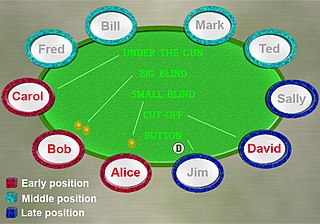
In the game of poker, the play largely centers on the act of betting, and as such, a protocol has been developed to speed up play, lessen confusion, and increase security while playing. Different games are played using different types of bets, and small variations in etiquette exist between cardrooms, but for the most part the following rules and protocol are observed by the majority of poker players.
Five-card stud is the earliest form of the card game stud poker, originating during the American Civil War, but is less commonly played today than many other more popular poker games. It is still a popular game in parts of the world, especially in Finland where a specific variant of five-card stud called Sökö is played. The word sökö is also used for checking in Finland.
Seven-card stud, also known as Seven-Toed Pete or Down-The-River is a variant of stud poker. Before the 2000s surge of popularity of Texas hold 'em, seven-card stud was the most widely played poker variant in home games across the United States, and in casinos in the eastern part of the country. Although seven-card stud isn't as common in casinos today, it is still played online. The game is commonly played with two to eight players, though eight may require special rules for the last cards dealt if no players fold. With experienced players who fold often, playing with nine players is possible.

Texas hold 'em is one of the most popular variants of the card game of poker. Two cards, known as hole cards, are dealt face down to each player, and then five community cards are dealt face up in three stages. The stages consist of a series of three cards, later an additional single card, and a final card. Each player seeks the best five card poker hand from any combination of the seven cards; the five community cards and their two hole cards. Players have betting options to check, call, raise, or fold. Rounds of betting take place before the flop is dealt and after each subsequent deal. The player who has the best hand and has not folded by the end of all betting rounds wins all of the money bet for the hand, known as the pot. In certain situations, a "split-pot" or "tie" can occur when two players have hands of equivalent value. This is also called a "chop-pot". Texas hold 'em is also the H game featured in HORSE and in HOSE.
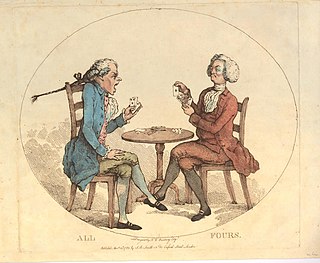
All Fours is a traditional English card game, once popular in pubs and taverns as well as among the gentry, that flourished as a gambling game until the end of the 19th century. It is a trick-taking card game that was originally designed for two players, but developed variants for more players. According to Cotton, the game originated in Kent, but spread to the whole of England and eventually abroad. It is the eponymous and earliest recorded game of a family that flourished most in 19th century North America and whose progeny include Pitch, Pedro and Cinch, games that even competed with Poker and Euchre. Nowadays the original game is especially popular in Trinidad and Tobago, but regional variants have also survived in England. The game's "great mark of distinction" is that it gave the name 'Jack' to the card previously known as the Knave.
High card by suit and low card by suit refer to assigning relative values to playing cards of equal rank based on their suit. When suit ranking is applied, the most common conventions are:

In poker, the buck or dealer button is a marker used to indicate the player who is dealing or, in casino games with a house dealer, the player who acts last on that deal. The term button is also used for a variety of plastic discs, or lammers, used by casinos to mark the status of players.
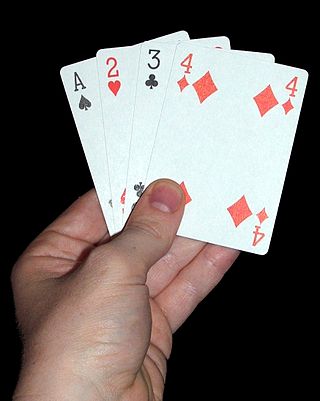
Badugi is a draw poker variant similar to triple draw, with hand-values similar to lowball. The betting structure and overall play of the game is identical to a standard poker game using blinds, but, unlike traditional poker which involves a minimum of five cards, players' hands contain only four cards at any one time. During each of three drawing rounds, players can trade zero to four cards from their hands for new ones from the deck, in an attempt to form the best badugi hand and win the pot. Badugi is often a gambling game, with the object being to win money in the form of pots. The winner of the pot is the person with the best badugi hand at the conclusion of play. Badugi is played in cardrooms around the world, as well as online, in rooms such as PokerStars. Although it hasn’t had its own tournament per se at the WSOP, it is featured in the Dealers Choice events as well as in the Triple Draw Mix. A Badugi tournament is scheduled during the 2023 WSOP event.
Rake is the scaled commission fee taken by a cardroom operating a poker game. It is generally 2.5% to 10% of the pot in each poker hand, up to a predetermined maximum amount. There are also other non-percentage ways for a casino to take the rake.
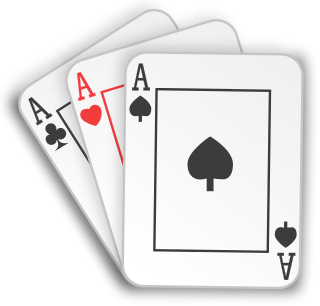
Teen patti is a gambling card game. Teen Patti originated in the Indian subcontinent and is popular throughout South Asia. It originated in the English game of three-card brag, with influences from poker. It is also called flush or flash in some areas.
The following is a glossary of poker terms used in the card game of poker. It supplements the glossary of card game terms. Besides the terms listed here, there are thousands of common and uncommon poker slang terms. This is not intended to be a formal dictionary; precise usage details and multiple closely related senses are omitted here in favor of concise treatment of the basics.
Draw poker is any poker variant in which each player is dealt a complete hand before the first betting round, and then develops the hand for later rounds by replacing, or "drawing", cards.
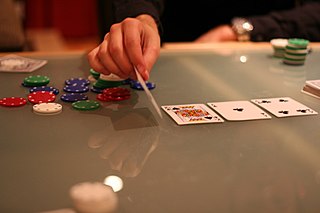
Community card poker refers to any game of poker that uses community cards, which are cards dealt face up in the center of the table and shared by all players. In these games, each player is dealt an incomplete hand face down, which are then combined with the community cards to make a complete hand. The set of community cards is called the "board", and may be dealt in a simple line or arranged in a special pattern. Rules of each game determine how they may be combined with each player's private hand. The most popular community card game today is Texas hold 'em, originating sometime in the 1920s.
Ultimate Texas Hold 'Em is registered trademark of Bally Gaming, Inc. and refers to a reinvented variant of the classic poker game Texas hold 'em. In this variation, the player does not compete against other players. Instead, they play only against the dealer. At any point during the course of the hand, the player is free to make one raise. In this poker-based game, the earlier the raise is made, the higher its value is.








